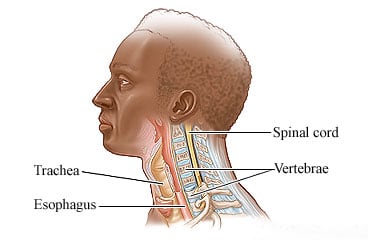
Overview
A broken neck can range from a small, hairline crack, to a bone or bones breaking into two or more pieces. Treatment for a broken neck depends on how bad the break is and which bones are involved. You may be sent home with a neck brace or collar. You can help your neck heal with care at home.
Healthy habits can help you heal. Eat a variety of healthy foods, and don't smoke.
Follow-up care is a key part of your treatment and safety. Be sure to make and go to all appointments, and call your doctor if you are having problems. It's also a good idea to know your test results and keep a list of the medicines you take.
How can you care for yourself at home?
- If you were fitted for a neck brace, wear it exactly as directed by your doctor. Do not take it off until your doctor tells you to.
- Be safe with medicines. Read and follow all instructions on the label.
- If you are not taking a prescription pain medicine, ask your doctor if you can take an over-the-counter medicine.
- If the doctor gave you a prescription medicine for pain, take it as prescribed.
- Store your prescription pain medicines where no one else can get to them. When you are done using them, dispose of them quickly and safely. Your local pharmacy or hospital may have a drop-off site.
- Follow your doctor's directions for returning to your normal activities.
- Do any exercises that you are given to keep your muscles strong and reduce stiffness.
- Put ice or a cold pack on the painful area for 10 to 20 minutes at a time. Try to do this every 1 to 2 hours for the next 3 days (when you are awake). Put a thin cloth between the ice and your skin or brace.
- Make sure that paths in your home are clear so that you do not fall. Also make sure that lighting is good and that carpets are tacked down to prevent tripping.
- Do not drive unless your doctor says that it is okay. If you are allowed to drive, always wear a seat belt.
- Talk to your doctor about medicines or changes in your diet that can help make your bones stronger.
When should you call for help?
Call 911 anytime you think you may need emergency care. For example, call if:
- You are unable to move an arm or a leg at all.
Call your doctor now or seek immediate medical care if:
- You have new or worse symptoms in your arms, legs, belly, or buttocks. Symptoms may include:
- Numbness or tingling.
- Weakness.
- Pain.
- You lose bladder or bowel control.
Watch closely for changes in your health, and be sure to contact your doctor if:
- You have problems with your neck brace.
- You are not getting better as expected.
Where can you learn more?
Go to http://www.healthwise.net/patientEd
Enter U000 in the search box to learn more about "Broken Neck: Care Instructions".
Current as of: July 24, 2025
Author: Ignite Healthwise, LLC Staff
Clinical Review Board
All Ignite Healthwise, LLC education is reviewed by a team that includes physicians, nurses, advanced practitioners, registered dieticians, and other healthcare professionals.

